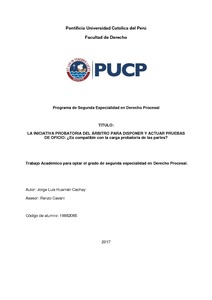| dc.contributor.advisor | Cavani Brain, Renzo Ivo | |
| dc.contributor.author | Huamán Cachay, Jorge Luis | es_ES |
| dc.date.accessioned | 2018-03-28T00:19:25Z | es_ES |
| dc.date.available | 2018-03-28T00:19:25Z | es_ES |
| dc.date.created | 2017 | es_ES |
| dc.date.issued | 2018 | es_ES |
| dc.identifier.uri | http://hdl.handle.net/20.500.12404/11768 | |
| dc.description.abstract | El principio de flexibilidad interviene en las diversas etapas del proceso arbitral, siendo uno de ellas la actividad probatoria, confluyendo, a su vez, con otras situaciones jurídicas de titularidad de las partes, que se plasman en principios tales como el dispositivo, aportación de parte y, además, con la llamada asunción de la carga de la prueba. Por otro lado, se ha sostenido que el ejercicio de la potestad con que cuenta el árbitro para hacer valer su iniciativa probatoria –al igual que un juez–, puede llevar a que incurra en excesos al momento de disponer u ordenar de oficio la actuación de una prueba. Partiendo entonces de ambas premisas examinaremos cómo estas interactúan en el arbitraje privado doméstico, tomando como marco normativo la actual Ley de Arbitraje (LDA), así como los reglamentos de los principales centros de arbitraje del país (RCA). | es_ES |
| dc.description.abstract | The principle of flexibility intervenes in the various stages of the arbitration process, one of them being the probative activity, converging, in turn, with other legal
situations of ownership of the parties, which are embodied in principles such as the device, contribution of part and, in addition, with the so-called assumption of the burden of proof. On the other hand, it has been argued that the exercise of the power available to the arbitrator to assert his evidentiary initiative -as a judge- can lead to excesses when disposing or ordering the action of a test. Starting from both premises we will examine how they interact in private domestic arbitration, taking the current Arbitration Law (LDA) as a regulatory framework, as well as the regulations of the main arbitration centers of the country (RCA). | es_ES |
| dc.language.iso | spa | es_ES |
| dc.publisher | Pontificia Universidad Católica del Perú | es_ES |
| dc.rights | Atribución-NoComercial-SinDerivadas 2.5 Perú | * |
| dc.rights | info:eu-repo/semantics/openAccess | es_ES |
| dc.rights.uri | http://creativecommons.org/licenses/by-nc-nd/2.5/pe/ | * |
| dc.subject | Prueba (Derecho)--Péru | es_ES |
| dc.subject | Arbitraje--Legislación--Perú | es_ES |
| dc.title | La iniciativa probatoria del árbitro para disponer y actuar pruebas de oficio : ¿es compatible con la carga probatoria de las partes? | es_ES |
| dc.type | info:eu-repo/semantics/bachelorThesis | es_ES |
| thesis.degree.name | Segunda Especialidad en Derecho Procesal | es_ES |
| thesis.degree.level | Título Profesional | es_ES |
| thesis.degree.grantor | Pontificia Universidad Católica del Perú. Facultad de Derecho | es_ES |
| thesis.degree.discipline | Derecho Procesal | es_ES |
| renati.advisor.dni | 43438174 | |
| renati.advisor.orcid | https://orcid.org/0000-0001-8040-8185 | es_ES |
| renati.discipline | 421109 | es_ES |
| renati.level | https://purl.org/pe-repo/renati/level#tituloSegundaEspecialidad | es_ES |
| renati.type | https://purl.org/pe-repo/renati/type#trabajoAcademico | es_ES |
| dc.publisher.country | PE | es_ES |
| dc.subject.ocde | https://purl.org/pe-repo/ocde/ford#5.05.01 | es_ES |






